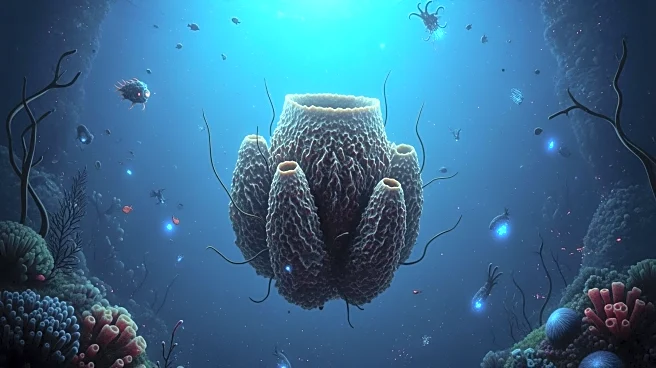What's Happening?
A new species of carnivorous sponge, nicknamed the 'death-ball sponge,' has been discovered by researchers during an expedition in the South Sandwich Trench near Antarctica. This sponge, part of the genus
Cladorhizidae, features appendages ending in gelatinous orbs covered in micro-hooks designed to capture prey such as small crustaceans. The discovery was made by the Nippon Foundation–Nekton Ocean Census team aboard the Schmidt Ocean Institute's R/V Falkor. The expedition has been ongoing since April 2023, utilizing advanced technology to explore previously unseen underwater landscapes and collect specimens. The 'death-ball sponge' is among several new species identified, including iridescent armored scale worms and black corals.
Why It's Important?
The discovery of the 'death-ball sponge' highlights the vast, unexplored biodiversity of the Southern Ocean. This region remains under-sampled, with only 30% of collected samples assessed, revealing 30 new species. The findings underscore the importance of deep-sea exploration in understanding marine ecosystems and biodiversity. The research could lead to new insights into the ecological roles of carnivorous sponges and their impact on oceanic food chains. Additionally, the expedition's use of cutting-edge technology exemplifies the potential for scientific advancement through global collaboration, potentially influencing future oceanographic research and conservation efforts.
What's Next?
The specimens collected during the expedition, including the 'death-ball sponge,' are being studied at the Southern Ocean Species Discovery Workshop in Chile. Researchers are using DNA barcoding to identify whether these organisms are new species or known species in different life stages. As the expedition continues, further analysis of collected samples may reveal additional undiscovered species, contributing to a more comprehensive understanding of ocean biodiversity. The ongoing research could also inform conservation strategies and policies aimed at protecting these unique marine environments.
Beyond the Headlines
The discovery of carnivorous sponges challenges previous assumptions about sponge feeding behaviors, traditionally seen as passive filter feeders. This revelation may prompt a reevaluation of marine biology theories and inspire new research into the evolutionary adaptations of deep-sea organisms. The findings also raise questions about the ecological balance in abyssal ecosystems and the potential impact of human activities on these fragile environments.









